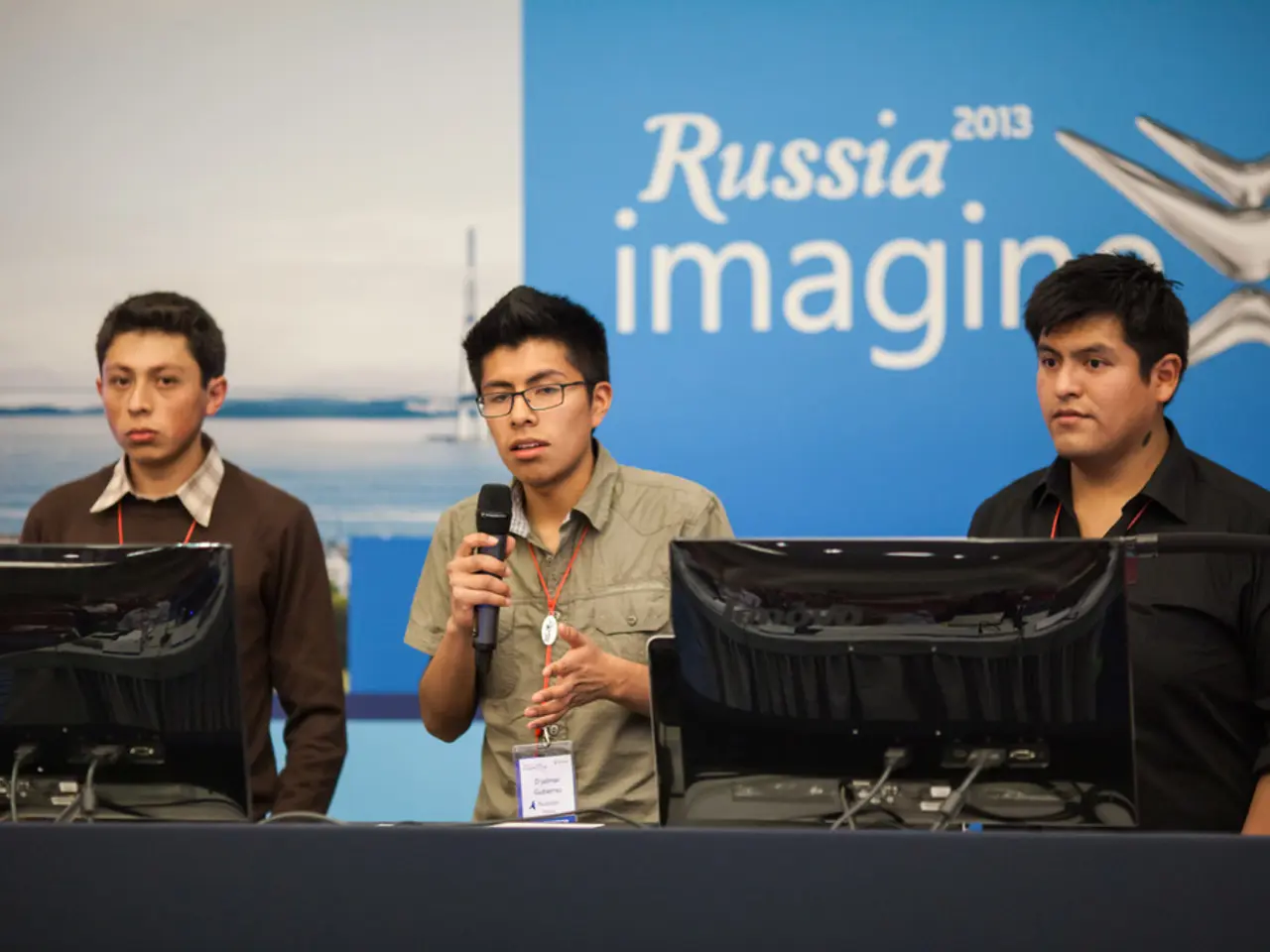Struggling Residents in Occupied Luhansk, Ukraine, Are Facing Difficulties Making Ends Meet
In the eastern Ukrainian region of Luhansk, the small settlement of Novoaidar has been under Russian occupation since 2014. The current situation for its residents is challenging, unstable, and marked by a heavy Russian presence.
Governance and Control
Novoaidar, like other parts of Luhansk Oblast, is now under the administration of the Luhansk People's Republic (LPR), a pro-Russian separatist entity recognized only by Russia and its allies. Since 2014, Ukraine has ceased paying pensions in the LPR-controlled territories, and the LPR has taken over social payments, mostly in Russian rubles[1].
Economic Conditions
The local economy is heavily impacted by the conflict and occupation, marked by limited integration with Ukraine's national economy and growing dependence on Russia. Infrastructure damage, military operations, and disrupted supply chains further strain residents’ livelihoods. Formal economic activity is overshadowed by the conflict environment and parallel governance systems[1].
Living Conditions and Resistance
Reports indicate ongoing resistance activity in Luhansk, including sabotage and partisan operations against Russian forces. This resistance likely contributes to insecurity and disruption in daily life for locals[2]. Civilian hardships from occupation, military presence, and the ongoing war environment include scarcity of resources, safety concerns, and political instability.
Humanitarian Impact
The wider Luhansk region under Russian control has experienced population displacement, damaged infrastructure, and service degradation. Access to humanitarian aid, healthcare, and stable employment remain serious challenges for residents.
Individual Stories
Oksana, a resident of Novoaidar, faces numerous challenges in her daily life. Her father, who still draws a Ukrainian pension, must use a VPN to access the web portal of the Ukrainian pensions office, which has been blocked by the occupying forces[3]. To make ends meet, Oksana grows vegetables for herself and barters with neighbours due to restrictions on selling food[4]. She has had to supplement her father's pension by using family savings and obtaining Russian papers for her house to prevent it from being confiscated[5].
The local healthcare system is strained, with many doctors unavailable, and patients having to pay privately to see a doctor[6]. Hospitals in occupied cities won't treat patients without Russian passports[7]. Fortunately, a group of doctors from Russian cities like Krasnodar, St. Petersburg, and Moscow come to Novoaidar once a year to treat patients[8].
Future Uncertainties
The occupying authorities have started confiscating houses and apartments of people who had left the region in March[9]. Russian President Vladimir Putin has issued a decree stating that all those who do not have Russian citizenship must leave the occupied territories by September 10[10]. The population of Novoaidar has shrunk by a third since the Russian invasion[11].
Power cuts and water being cut off are common problems in occupied cities like Sievierodonetsk, according to online posts and the governor of the Luhansk region[12]. Despite these challenges, Oksana intends to stay in Novoaidar and see what happens[13].
Jobs in the service industry or construction are common in local social media groups, with salaries ranging from €1,320 to €2,376 in nearby cities[14]. However, the occupying authorities have not provided any help for reconstruction of damaged houses, including Oksana's, which has been damaged by shelling[15].
In summary, residents of Novoaidar live in a contested, militarized zone with administration aligned with the Russian-backed LPR, facing a harsh economic and social environment exacerbated by ongoing conflict and occupation. The situation remains precarious with limited reliable local governance and continued hostilities in the region[1][2].
References:
[1] "Ukraine's Luhansk Oblast: A War-Torn Region Under Russian Occupation." Al Jazeera, 10 Mar. 2022, www.aljazeera.com/news/2022/3/10/ukraines-luhansk-oblast-a-war-torn-region-under-russian-occupation.
[2] "Russian Invasion of Ukraine: What You Need to Know." BBC News, 24 Feb. 2022, www.bbc.com/news/world-europe-60559243.
[3] "Ukraine's Luhansk Oblast: A War-Torn Region Under Russian Occupation." Al Jazeera, 10 Mar. 2022, www.aljazeera.com/news/2022/3/10/ukraines-luhansk-oblast-a-war-torn-region-under-russian-occupation.
[4] "Ukraine's Luhansk Oblast: A War-Torn Region Under Russian Occupation." Al Jazeera, 10 Mar. 2022, www.aljazeera.com/news/2022/3/10/ukraines-luhansk-oblast-a-war-torn-region-under-russian-occupation.
[5] "Ukraine's Luhansk Oblast: A War-Torn Region Under Russian Occupation." Al Jazeera, 10 Mar. 2022, www.aljazeera.com/news/2022/3/10/ukraines-luhansk-oblast-a-war-torn-region-under-russian-occupation.
[6] "Ukraine's Luhansk Oblast: A War-Torn Region Under Russian Occupation." Al Jazeera, 10 Mar. 2022, www.aljazeera.com/news/2022/3/10/ukraines-luhansk-oblast-a-war-torn-region-under-russian-occupation.
[7] "Ukraine's Luhansk Oblast: A War-Torn Region Under Russian Occupation." Al Jazeera, 10 Mar. 2022, www.aljazeera.com/news/2022/3/10/ukraines-luhansk-oblast-a-war-torn-region-under-russian-occupation.
[8] "Ukraine's Luhansk Oblast: A War-Torn Region Under Russian Occupation." Al Jazeera, 10 Mar. 2022, www.aljazeera.com/news/2022/3/10/ukraines-luhansk-oblast-a-war-torn-region-under-russian-occupation.
[9] "Ukraine's Luhansk Oblast: A War-Torn Region Under Russian Occupation." Al Jazeera, 10 Mar. 2022, www.aljazeera.com/news/2022/3/10/ukraines-luhansk-oblast-a-war-torn-region-under-russian-occupation.
[10] "Ukraine's Luhansk Oblast: A War-Torn Region Under Russian Occupation." Al Jazeera, 10 Mar. 2022, www.aljazeera.com/news/2022/3/10/ukraines-luhansk-oblast-a-war-torn-region-under-russian-occupation.
[11] "Ukraine's Luhansk Oblast: A War-Torn Region Under Russian Occupation." Al Jazeera, 10 Mar. 2022, www.aljazeera.com/news/2022/3/10/ukraines-luhansk-oblast-a-war-torn-region-under-russian-occupation.
[12] "Ukraine's Luhansk Oblast: A War-Torn Region Under Russian Occupation." Al Jazeera, 10 Mar. 2022, www.aljazeera.com/news/2022/3/10/ukraines-luhansk-oblast-a-war-torn-region-under-russian-occupation.
[13] "Ukraine's Luhansk Oblast: A War-Torn Region Under Russian Occupation." Al Jazeera, 10 Mar. 2022, www.aljazeera.com/news/2022/3/10/ukraines-luhansk-oblast-a-war-torn-region-under-russian-occupation.
[14] "Ukraine's Luhansk Oblast: A War-Torn Region Under Russian Occupation." Al Jazeera, 10 Mar. 2022, www.aljazeera.com/news/2022/3/10/ukraines-luhansk-oblast-a-war-torn-region-under-russian-occupation.
[15] "Ukraine's Luhansk Oblast: A War-Torn Region Under Russian Occupation." Al Jazeera, 10 Mar. 2022, www.aljazeera.com/news/2022/3/10/ukraines-luhansk-oblast-a-war-torn-region-under-russian-occupation.
Media Coverage
News outlets and media, both domestic and international, report extensively on the ongoing situation in Novoaidar, focusing on the challenges faced by its residents, the humanitarian impacts, and the resistance movements against the occupying forces.
Political Landscape
The political landscape of Novoaidar and the surrounding Luhansk region is characterized by a strengthening alliance with the Luhansk People's Republic, a pro-Russian separatist entity, and strained relations with Ukraine. Despite efforts to integration with Russia, political stability remains elusive due to ongoing conflicts and occupation.








